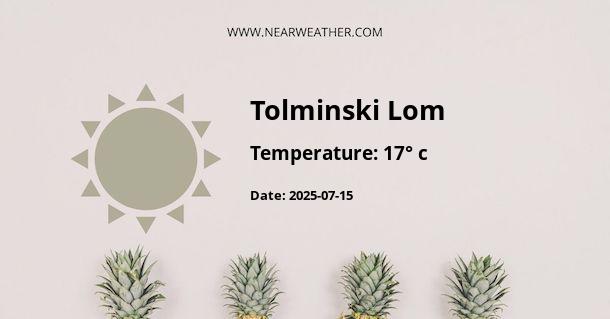Tolminski Lom Weather Today
Daily Weather Forecast & Temperature in Tolminski Lom
Sun & Moon
Location Info
Embed This Weather
Exploring the Climate and Weather of Tolminski Lom, Slovenia
Tolminski Lom, nestled in the picturesque region of Slovenia, offers a unique climate influenced by its geography. This small European nation boasts a diversity of landscapes, from the stunning Adriatic coastline to the rugged Alpine peaks, creating microclimates that profoundly affect local weather patterns. This robust exploration into the climatic conditions of Tolminski Lom provides insight for visitors and residents alike, ensuring an understanding of what to expect from this beautiful, yet climatically varied destination.
Overview of Tolminski Lom's Geographical Setting
Tolminski Lom is strategically located in the terrain that provides a blend of Mediterranean, Alpine, and Continental climates. These influences congregate to create a weather profile that features a mix of mild to hot summers and cool to freezing winters, depending on the altitude and topography.
Seasonal Climate Patterns
Understanding Tolminski Lom's seasonal weather patterns is essential for those looking to visit or ascertain the region's climate for agriculture, outdoor activities, and lifestyle considerations.
Spring
Spring in Tolminski Lom showcases a period of transition, with temperatures gradually rising and the precipitation patterns shifting. This season is characterized by:
- Increasing daily temperatures, with an average range from 8°C to 15°C (46°F to 59°F).
- Variable precipitation, with April often being the wettest month.
- The blooming of flora, making it a beautiful time to explore the region’s natural beauty.
Summer
Summers are typically warm and can be quite sunny, making this season ideal for outdoor enthusiasts. The key features of the summer climate include:
- July and August as the warmest months, with temperatures often reaching over 25°C (77°F).
- Occasional heatwaves due to Mediterranean influence, pushing temperatures higher.
- Evening thunderstorms that can develop due to the region's complex topography.
Autumn
The autumn months usher in a period of cooling with vibrant fall colors enveloping the landscape. Visitors can expect:
- Decreasing temperatures, with averages ranging from 10°C to 20°C (50°F to 68°F).
- Increased rainfall, particularly in November, as the region transitions into winter.
- Favorable conditions for harvesting local produce, contributing to Tolminski Lom's culinary experiences.
Winter
Winters are generally cold and vary greatly with elevation. Weather characteristics include:
- Average temperatures between -2°C and 3°C (28°F to 37°F).
- Snowfall, especially at higher altitudes, which contributes to the region’s winter sports activities.
- Potential for temperature inversions in the valleys, leading to colder conditions at lower altitudes.
Annual Precipitation and Humidity
Precipitation in Tolminski Lom occurs year-round, with variations influenced by seasonal weather patterns:
| Month | Average Precipitation (mm) | Average Humidity (%) |
|---|---|---|
| January | 100 | 87 |
| February | 80 | 79 |
| March | 110 | 74 |
| April | 140 | 71 |
| May | 130 | 73 |
| June | 150 | 74 |
| July | 120 | 69 |
| August | 130 | 71 |
| September | 150 | 79 |
| October | 180 | 83 |
| November | 220 | 89 |
| December | 140 | 87 |
Note: These averages are subject to change due to ongoing climate fluctuations and should be used as a general guide.
Extremes and Unusual Weather Events
Due to its wide range of elevations and proximity to different climatic zones, Tolminski Lom is vulnerable to a variety of weather extremes and unusual events like:
- Intense thunderstorms with the possibility of flash flooding in the summer months.
- Heatwaves, particularly affecting lower altitudes and urban areas.
- Heavy snowfall and avalanches in the mountainous regions during winter.
Impact of Climate on Local Life and Activities
The climate in Tolminski Lom plays a pivotal role in influencing the daily life of residents and the types of activities available to visitors. Agricultural practices, for instance, must align with seasonal changes to ensure sustainable crop production. The region’s renowned outdoor activities, such as hiking, skiing, and paragliding, are greatly dependent on weather conditions. Planning around the climate is thus essential for the local economy and the well-being of its community.
Climatic Trends and Future Outlook
Climate change has a significant impact on local weather patterns, potentially altering the traditional climates found in the region. Research suggests trends of increasing temperatures and varying precipitation patterns in Slovenia, which could affect Tolminski Lom:
- The potential for more extreme weather events, impacting agriculture and tourism.
- Shifts in the timing of seasons, possibly affecting local flora and fauna.
- A longer growing season, which could offer both challenges and opportunities to local farmers.
Conclusion
The climate and weather in Tolminski Lom, Slovenia, carry a rich tapestry of influences from Alpine, Mediterranean, and Continental sources which defines this destination's unique appeal. For those living in or visiting the area, an appreciation of the seasonal changes and understanding of the potential impact of climate change is crucial. By respecting and adapting to these natural patterns, Tolminski Lom's residents and guests can continue to enjoy the beauty and natural diversity that this region has to offer.
What is the Latitude and Longitude of Tolminski Lom?
Tolminski Lom's Latitude is 46.128609 & Longitude is 13.747220.
What is the weather in Tolminski Lom today?
Weather in Tolminski Lom is -1° today.
What is the climatic condition of Tolminski Lom today?
Climate Conditions in Tolminski Lom shows overcast clouds today.
What is the humidity in Tolminski Lom today?
Humidity in Tolminski Lom is 94% today.
What is the wind speed in Tolminski Lom today?
Wind speed in Tolminski Lom is 1.62 km/h, flowing at 61° ENE wind direction.
What does it feel like in Tolminski Lom today?
It feels like -1° in Tolminski Lom today, with 100% cloud cover and 10 km visibility.
